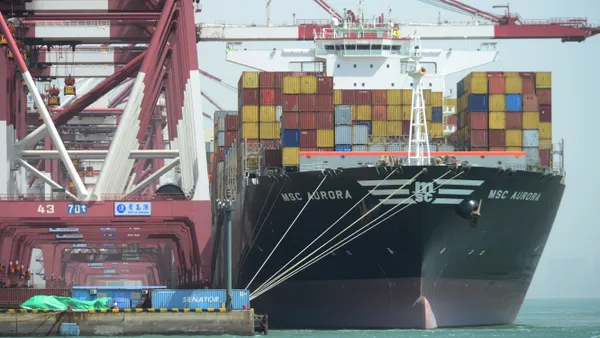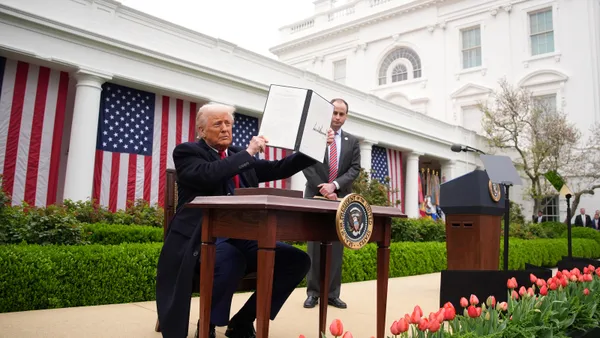UPDATE, March 8 — President Donald Trump signed an order Thursday authorizing a global 25% tariff on steel imports and a 10% tariff on aluminum tariffs, NPR reported. The order exempts imports from Canada and Mexico, as Canada remains the top supplier of both materials to the U.S — the country accounts for 16% of imported steel and 41% of imported aluminum.
Though the tariffs have been lauded by U.S. steel workers, the move stands to raise costs on construction and infrastructure projects and could have dire consequences for the industry's labor force. According to a study by The Trade Partnership, construction could lose as many as 28,000 jobs in response to the tariffs. Price uncertainty surrounding the materials could also be a blow to mega-developments, like New York's Hudson Yards and the $1.9 billion Raiders Stadium in Las Vegas.
A number of industry associations came out in opposition to the tariffs, with Associated General Contractors of America CEO Stephen Sandherr warning of the move's consequences for U.S. construction.
"These new tariffs will cause significant harm to the nation’s construction industry, put tens of thousands of high-paying construction jobs at risk, undermine the President’s proposed infrastructure initiative and potentially dampen demand for new construction projects for years to come," Sandherr wrote in a statement. "That is because the newly-imposed tariffs will lead to increases in what construction firms are forced to pay for the many steel and aluminum products that go into a typical construction project."
Dive Brief:
- President Donald Trump announced Thursday that the U.S. would begin imposing a 25% tariff on steel imports and a 10% tariff on aluminum imports beginning next week, according to Reuters. The administration is sidestepping the World Trade Organization and instituting the tariffs based on what it has deemed an issue of national security.
- U.S. steel and aluminum manufacturers' stock prices jumped following the news, but fears of higher prices and retaliatory action from U.S. trade partners forced shares lower for companies that rely on these products, notably car and airplane manufacturers.
- There are no specifics about the tariffs' implementation or possible exemptions for certain trade partners, but the United Steelworkers union is advocating for an exemption for Canada, according to Engineering News-Record. Union representatives favor an exemption, representatives noted, because the country does not engage in illegal product dumping. Canada which fills 16% of steel demand in the U.S., said that, should the tariffs be implemented, the country would "take responsive measures to defend its trade interests and workers."
Dive Insight:
High-rises, large residential multifamily projects and infrastructure projects are major buyers of steel and aluminum. Construction companies are likely to begin bracing for a wave of cost increases and the possibility of having to decide whether certain developments are now too expensive to build.
In a March 1 spending report, the Associated General Contractors of America (AGC) said the higher prices resulting from the tariffs could stymie much-needed infrastructure investment and undercut the administration's efforts to get the president's $1.5 trillion infrastructure program underway.
AGC Chief Economist Ken Simonson said adding to the already-high prices for aluminum and steel could wreak havoc on both public and private project budgets. If a trade war erupts and U.S. trade partners take retaliatory measures by imposing tariffs on U.S. goods sold abroad, exporters', transportation companies' and ports' businesses would be negatively affected, he said in the release, and would reduce the need for construction in those areas.
Prior to the president's tariff announcement, Anirban Basu, chief economist for the Associated Builders and Contractors, told Engineering News-Record that contractors who buy a great deal of steel might want to lock in steel prices with futures contracts — but it could be too late to employ that strategy.














